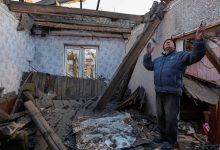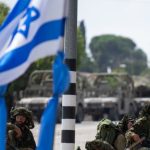The bright winter sun playing over caves in the pockmarked cliffs and the views out over the Mediterranean are idyllic. Yet look more closely at the seemingly peaceful view from the point where Israel’s border with Lebanon meets the sea, and menace lurks. Naval patrol boats loiter close to the shore, their guns bristling in readiness. A normally popular tourist attraction is deserted save for armoured vehicles. A short drive up the wooded mountainside just south of the border fence reveals dozens of camouflaged bivouacs where paratroopers of the Israel Defence Forces (idf) have been deployed since October 7th, the day of a devastating surprise attack by Hamas on Israeli communities and army bases in the south.
Though the scenery is tranquil, the risks are rapidly mounting of a full-blown war between Israel and Hizbullah, the Iran-backed Lebanese party and militia. Especially since a blast on January 2nd in Beirut’s Dahiye neighbourhood, Hizbullah’s main stronghold. The explosion, attributed to an Israeli drone strike, killed Saleh al-Arouri, a senior Hamas leader close to Iran, as well as several other commanders. Hizbullah responded by saying the killing would not go without “punishment” and that it has its “finger on the trigger”. Even before this strike, some European officials worried that the front could erupt within days or weeks.
Adding to the tension and uncertainty were two explosions on January 3rd in the Iranian city of Kerman that killed almost 100 people near the tomb of Qassem Suleimani. Many of them had gathered to mourn the commander of the Quds Force, the foreign-operations wing of Iran’s Islamic Revolutionary Guard Corps (irgc), who was assassinated in an American strike four years ago. Iran first blamed “terrorists” and then America and Israel for the latest blasts.
The risks of war on the Lebanese border first shot up in the hours and days immediately after the Hamas attack on Israel, which had feared that a similar strike was about to be carried out by Hamas’s ally, Hizbullah. Many of the hundreds of thousands of reservists called up that day were sent north. By nightfall entire divisions were deployed near the border, known as the blue line.
Top brass in Israel’s security establishment, including the defence minister, Yoav Gallant, favoured carrying out a pre-emptive attack on Hizbullah. That remained in the balance until Benny Gantz, the more pragmatic general and now centrist party leader, joined the government on October 11th. Urgings of restraint from America’s president, Joe Biden, who deployed an aircraft-carrier strike group off the coast of Lebanon, also played a part in convincing the Israelis to wait. In a visit to Israel on October 18th Mr Biden issued a warning. “To any state or any other hostile actor thinking about attacking Israel,” he said. “Don’t. Don’t. Don’t.”
What ensued was a deadly series of tit-for-tat strikes, with Hizbullah firing missiles and drones every day at Israeli civilian and military targets and Israel launching counter-attacks (see map). For the most part, both sides have hit targets close to the border, in accordance with tacit rules of engagement established over the years. In Israel and Lebanon, tens of thousands of civilians have fled the fighting, with cities like Israel’s Shlomi and Kiryat Shmona rendered ghost-towns. Over three months Hizbullah has lost more than 146 of its fighters, while 15 Israelis have been killed by the missiles. Three journalists on the Lebanese side were also killed.
There is a precedent for this situation. In 2006 Hizbullah launched a cross-border raid, attacking an idf patrol, killing five soldiers and snatching two of the bodies. The conflict rapidly spiralled into a 34-day war in which both sides bombarded each other. The idf launched a large ground operation inside Lebanon, but was fought to an embarrassing standstill by Hizbullah. Lebanon suffered most, with over a thousand civilians killed and massive damage done to infrastructure.
Hizbullah insists on defining itself as a “resistance” movement and has built up a formidable arsenal of around 150,000 missiles. A few hundred of these have the range and accuracy to hit anywhere in Israel. It boasts of having as many as 100,000 fighters (the actual number is probably half that), many of whom acquired recent battle-experience in Syria, where Hizbullah propped up the regime of Bashar al-Assad throughout a decade of civil war.
Hold your horses
These are strong reasons for Israel to avoid all-out war, but following the Hamas surprise attack, some senior Israeli security officials believe their country cannot allow such threats to remain on their border. They argue that Israel should take the initiative—especially as Hizbullah’s elite Radwan Force has been trained to attack Israeli territory with the same tactics Hamas used in its attack on Israeli communities and army bases.
An Israeli army spokesman says that the idf is “already fighting a war”, though “we’re still in defence mode at this point”. Commanders note the empty towns and kibbutzim nearby and say that for them the mission “is not completed as long as our civilians cannot return home in peace and Hizbullah is still here on the border”. Israeli soldiers, currently occupied with locating and destroying Hizbullah missile teams from afar, are prepared to go on the offensive.
Western officials say the idf has the military capacity to open a second front, even while the war in Gaza is going on, and to quickly envelop Hizbullah positions near the border within hours. Though a wider conflagration has at times appeared inevitable, efforts to defuse the situation persist. Hizbullah has withdrawn fighters from positions right on the fence to ones some 2-3km away from the border. This may be just a tactical retreat, but it is also a signal to the Israelis and the Americans that it wants to avoid a fight. Meanwhile, the idf has slightly reduced its force-levels, though they are still much higher than before October 7th. The Israelis are ready to go on the offensive at any moment.
Both sides have compelling reasons to avoid an escalation. Israel is embroiled in a bloody campaign on the ground in Gaza and has lost some 1,400 citizens and soldiers since October 7th. Hizbullah, for its part, knows it will not make itself popular by inviting Israeli retribution, particularly since many Lebanese remember the destruction of the war in 2006 and are watching the devastation of Gaza—where more than 22,000 Palestinians, most of them civilians, have been killed. Iran, which has seen Israel destroy a large part of Hamas’s military capabilities, is loth to squander its investment in Hizbullah, which provides a deterrent to an Israeli strike on Iran’s own nuclear facilities.
Even so, Iran has been freely using its proxies elsewhere in the region to keep Israel on edge. Militias it backs have launched rockets against Israel from Syria and Yemen, while in Iraq they are attacking American forces. The Houthis, who control large parts of Yemen, have also been disrupting global trade with attacks on cargo ships in the Red Sea. An international naval task-force led by America has been trying to guard shipping sailing through the Bab el-Mandeb strait, a key route that goes past Yemen and leads to the Suez canal. But major shipping lines are rerouting around South Africa, leading to longer and costlier voyages. Western ships have shot down a number of Houthi missiles and sunk several small Houthi boats.
Yet America is finding it hard to maintain its massive deployment in the region, which has helped to tamp down hostilities. On January 1st it said a carrier group would return to base, though a second one is still in the vicinity, as is a Marine force of about 2,000 troops. Even so, Israel worries that as America draws down its forces, its ability to deter Iran or Hizbullah from attacking Israel will diminish.
Israel’s response has been to try picking apart Iran’s proxies without provoking a wider backlash. On December 25th an air strike it almost certainly carried out near Damascus killed Razi Mousavi, a brigadier-general in Iran’s Quds Force. Mr Mousavi served for many years as a liaison between the irgc and Hizbullah and other Iranian-armed militant groups in the region.
Outsiders are trying to cool the situation on the Lebanese border. A close adviser to President Biden has been frequently visiting Israel and Lebanon in an attempt to broker an agreement that would defuse the situation. The basis for this could be un Resolution 1701, passed at the end of the war in 2006. It is supposed to keep Hizbullah’s forces north of the Litani river, which runs roughly parallel to the border, about 29km to the north. But the Lebanese army and the un’s peacekeeping force in Lebanon, unifil, which are tasked with enforcing the resolution, have failed to do so.
But stop digging tunnels
Israel claims that since 2006 Hizbullah has placed hundreds of rocket-launchers in civilian buildings across southern Lebanon in defiance of the un resolution. In December 2018 the idf revealed six cross-border tunnels excavated by Hizbullah in preparation for future attacks. Hizbullah has also set up observation posts along the border under the guise of an ecological front group named Green Without Borders. Many of these have been hit by Israel since October 7th.
Talks are not helped by Lebanon’s dysfunctional politics. The country has not had a president since October 2022 and has been run since then by a caretaker government. Yet some kind of agreement is not impossible. In October 2022 Israel and Lebanon agreed to demarcate their maritime border to allow for the exploration and exploitation of offshore gasfields in an area that each claimed belonged to its exclusive economic zone.
And although the leaders on each side are given to bombastic statements, in practice they have proved to be cautious. Binyamin Netanyahu, Israel’s longest-serving prime minister, has long exercised restraint in response to attacks across the border. And Hassan Nasrallah, Hizbullah’s leader for over three decades and Iran’s most powerful ally in the region, has seemed reluctant to provoke another war after badly miscalculating that Israel would not respond forcefully to Hizbullah’s raid in 2006.
Israel’s gamble is that he will remain cautious, even as it attacks Hamas’s leaders in Lebanon, and that he would rather pull his troops back across the Litani than risk losing them to an Israeli attack. “Nasrallah can contain this,” says one Israeli military official. “It’s still his choice.”







